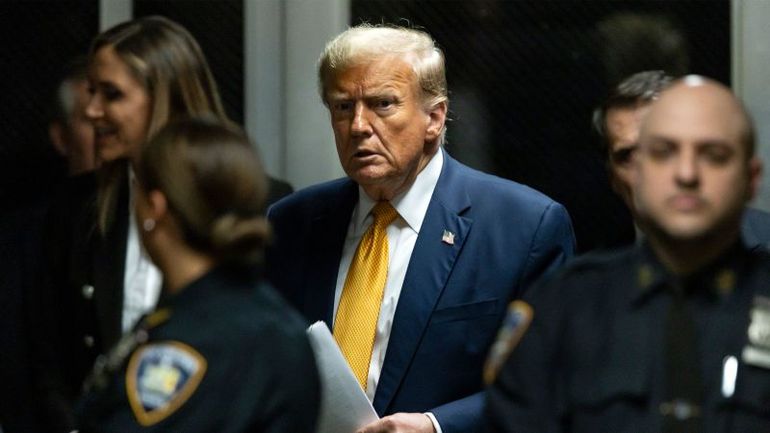
NY Appeals Court Rejects Trump's Request to Change Trial Venue After 6 Weeks

After six weeks of ongoing proceedings, a panel of New York State appellate judges has dismissed Donald Trump's appeal to relocate his criminal trial from Manhattan to a different county.
A group of judges in New York State rejected Donald Trump's request to relocate his ongoing criminal trial from Manhattan to a different county. The decision was made without providing any additional details in a brief ruling on Thursday. The trial, now in its sixth week, is centered around accusations of a hush money scheme before the 2016 election. Summations are set to take place next Tuesday, marking the beginning of the seventh week of the trial.
Trump's lawyers filed an appeal on the last day of jury selection last month. The appeal went through the routine procedure for a full review, which took several weeks to complete. This was one of two Trump motions denied by the appeals court on Thursday.
The denials mark the end of Trump's efforts to delay the trial through strategic appellate actions. Despite all of Trump's emergency requests to delay the trial being denied initially, he continued to file motions on the underlying issues, all of which have now been denied by the court.
Both the prosecution and Trump's defense have finished presenting their cases in the Manhattan criminal trial. The jury will now listen to closing arguments next Tuesday after the Memorial Day weekend break.
During an emergency hearing last month, a single appellate judge rejected Trump's request to halt the trial while awaiting a decision on the venue appeal. This hearing took place on the same day the jury was selected.
At the hearing, Trump’s attorney Cliff Robert expressed concern about seating a jury in just three days, especially after many potential jurors were dismissed for bias.
On the other hand, a lawyer representing the Manhattan District Attorney’s office argued that the thorough jury selection process, which led to the removal of biased jurors, demonstrated that the jury selection process was successful.
Trump's request for a stay over the change of venue motion was denied by the appeals court judges. He had made a similar appeal the week before, citing bias in the prospective jury pool. Despite renewing the request at the end of jury selection, it was unsuccessful.
Another petition from Trump's lawyers, challenging Judge Juan Merchan's pretrial rulings on recusal, motion filing procedures, and presidential immunity, was also denied by a different panel of appeals court judges on Thursday.
Five days before the trial started, Trump's lawyers requested to postpone the trial until the appeals court made a decision on certain issues. The request was denied after a quick hearing on April 10. The order issued on Thursday officially rejects the petition.
In the order filed on Thursday, the panel stated that Trump's legal arguments did not prove that Merchan had made incorrect decisions before the trial that required the appellate court to intervene at this point.
Trump has the option to request the appeals court to review the issues in a direct appeal after the trial has reached a final judgment, as stated in the ruling.
The ruling mentions that it would not be appropriate to use this discretion in this case because granting relief would disrupt the regular trial and appeals processes. It is noted that the issues raised by the petitioner can still be addressed in a direct appeal, without expressing an opinion on their validity.
Editor's P/S:
The ongoing criminal trial against former President Donald Trump in Manhattan highlights the complex interplay between the legal system and political influence. Despite Trump's repeated attempts to delay or relocate the trial, the court has consistently denied his requests. This underscores the impartiality of the judiciary and the adherence to due process, even in high-stakes cases involving prominent individuals.
The article also sheds light on the strategic maneuvering employed by both the prosecution and defense teams. Trump's lawyers have sought to challenge the impartiality of the jury and the rulings of the presiding judge, while the prosecution has emphasized the thorough jury selection process and the need for a fair trial. The upcoming summations and jury deliberations will be crucial in determining the outcome of this closely watched case.













